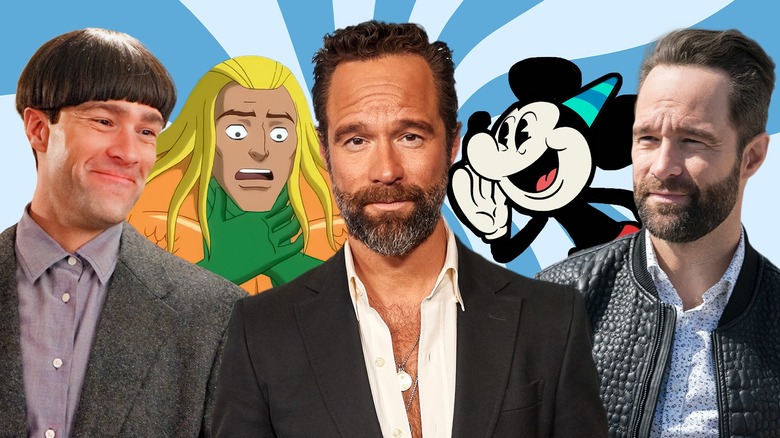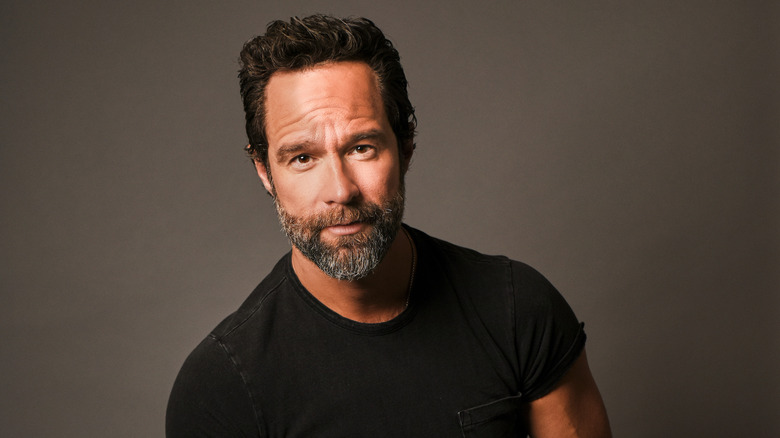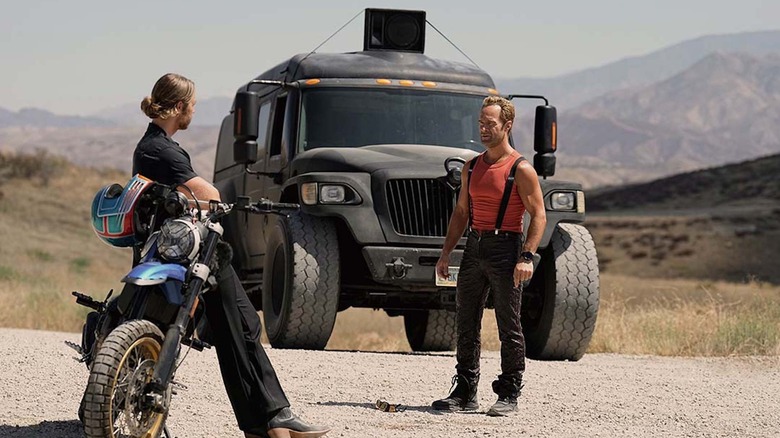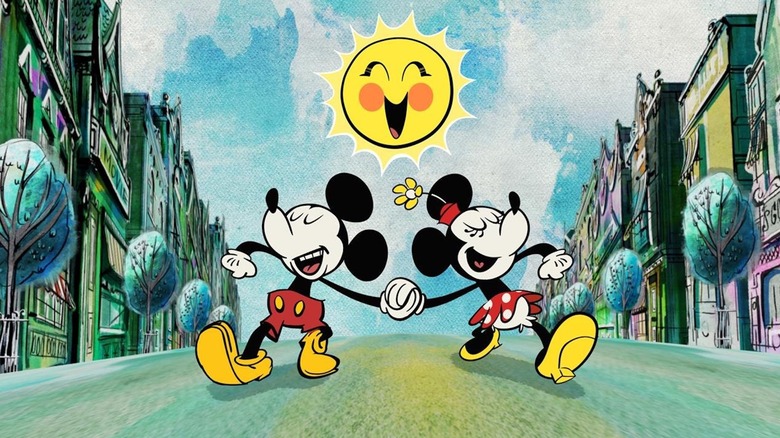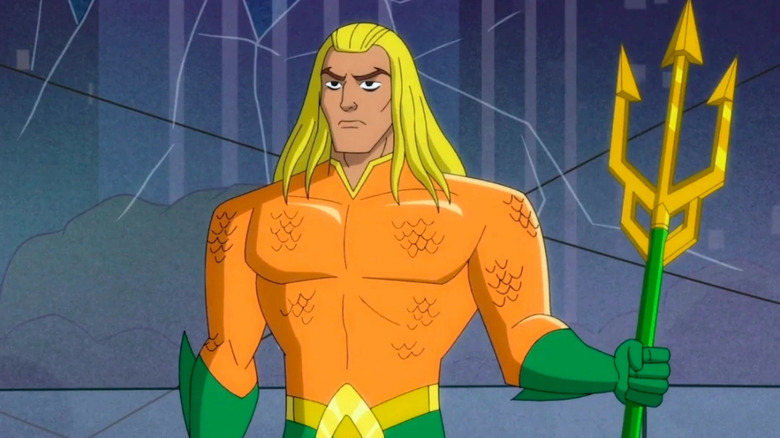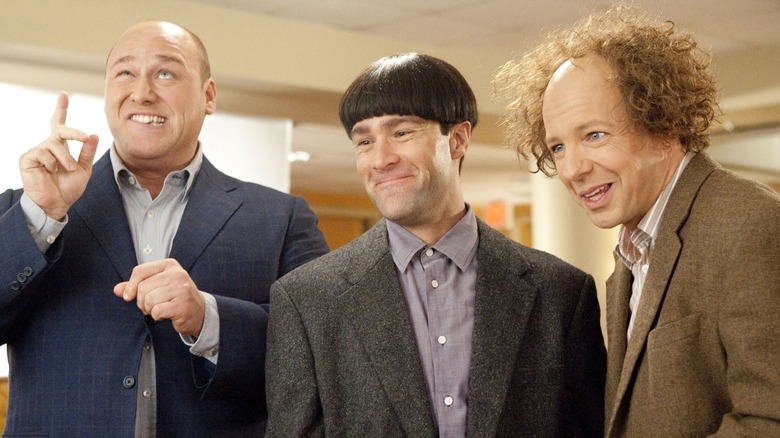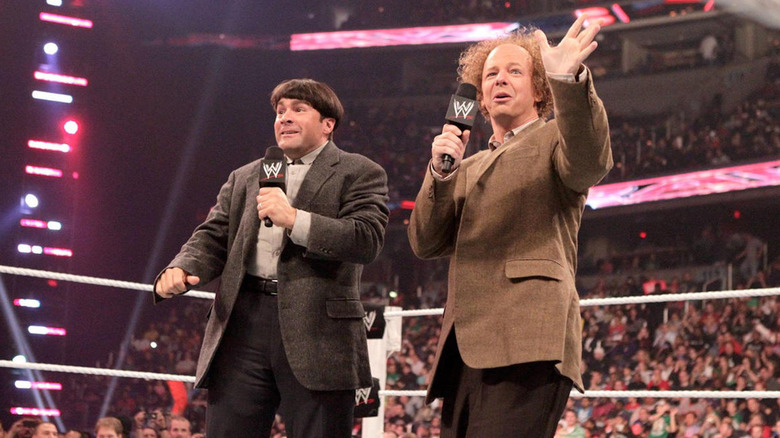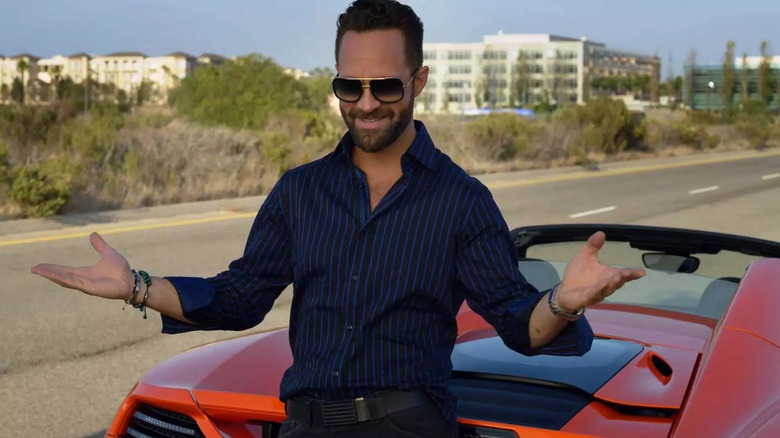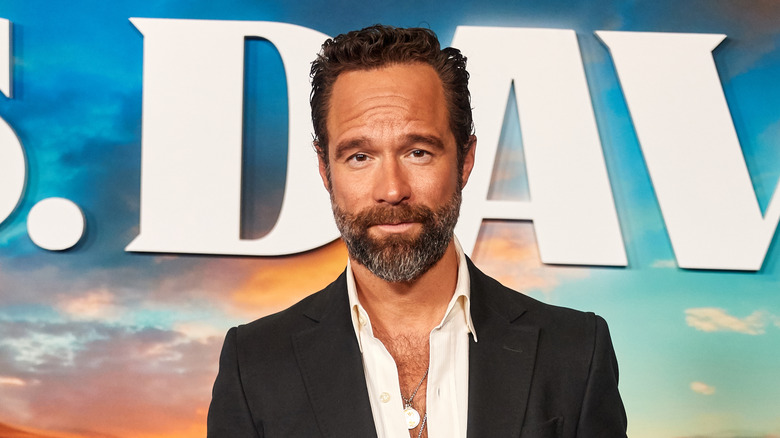Chris Diamantopoulos Has Been In Everything – And He's Not Slowing Down [Exclusive Interview]
If you're a movie or TV viewer, you've seen Chris Diamantopoulos. Probably many times. If you're an animation nerd, you've heard Chris Diamantopoulos. Again, probably many times. Anyone who is pop culture-literate in the year 2023 has encountered the actor in some capacity — even if you don't know his name, you know his face. But you can be forgiven for not recognizing his voice, because his chameleonic voiceover work suggests the work of a dozen different actors.
After cutting his teeth on the Broadway stage, Diamantopoulos smashed into film and television and has seemingly never stopped working. You may know him from roles on major TV series like "CSI," "24," "The Sopranos" and "Arrested Development," where he eased into those shows' distinct tones with ease. He was the sound guy who tempted Pam away from Jim in the final season of "The Office." He was that guy from the horse scene (you know the one) in "Hannibal." He was Russ Hanneman, the memorably egocentric billionaire from HBO's "Silicon Valley." In the voiceover booth, he has played various characters across the DC Universe: Steve Trevor, Green Arrow, and the egocentric Aquaman of "Harley Quinn." Roles in adult-skewing animated shows like the "Beavis and Butt-Head" reboot and "Family Guy" don't keep him from being the modern voice of Mickey Mouse in Disney's brilliant animated short films, a role he reprised in the theme park attraction Mickey and Minnie's Runaway Railway.
In short, Chris Diamantopoulos is everywhere. And he can do anything. And quite frankly, he's one of the best and most versatile actors working today, and one whose range and depth of talent has led to an IMDB page more full of "Oh, yeah! I remember that!" characters and moments than you can count.
This week, Diamantopoulos can be seen in "Mrs. Davis," Peacock's new head-spinning sci-fi series that defies casual explanation, but does feature the actor as JQ, a buff, enthusiastic Australian meathead working to battle an oppressive artificial intelligence sweeping the globe. As you'd imagine, he vanishes right into the part.
I recently spoke with Diamantopoulos over the phone for an extended conversation that took us from "Mrs. Davis" to '30s cartoons to Moe Howard and that 2012 "Three Stooges" movie that Diamantopoulos stands by, mixed reviews be damned. And yes, he knows exactly which Marvel character he wants to play, and yes, he's not shy about wanting to let you know.
Note: This interview has been lightly edited for clarity and brevity.
'I had a ball. It was a really big character swing for me'
When I told everybody at my site that I was talking to you, everybody had a different role to bring up.
Oh, that's so sweet, man. Well, dude, listen, I've been lucky enough to be doing ... I was on a plane flying into LA yesterday, and someone tapped me on the shoulder and said, "Hey, are you an actor?" I said, "Yeah, I am." They said, "What do I know you from?" I was like, "Oh gosh." It's like, "I don't know. Tell me what you watch." They rattled off a hundred shows. It's just so funny. I've been lucky enough to be able to be doing this nonsense for so many years, and it just never gets old, man. I'm always pleasantly surprised.
Just when I feel like maybe there's a genre or a tone or something that maybe I've experienced, I do something like "Mrs. Davis," and I'm like, "Well, this is f***ing brand new. I didn't even know something like this existed." I don't know how you would categorize it. I should ask you, Jacob, have you seen anything other than the teaser or the trailer? Have you watched any of the show yet?
I watched the first two episodes at the SXSW Film Festival.
Okay, so we can chat a little bit about this, and maybe you can give me your opinion. Have you ever seen anything like this show before?
No, I haven't. People keep asking me to describe it, and I keep on ... my obtuse way of telling people to watch it is it's like Monty Python doing Neal Stephenson.
My God! Dude! Dude, Jacob, that's exactly ... it's funny because I say it's like if Tarantino decided to make a TV show and he hired the Coen brothers to show run it.
I interviewed Michael Emerson a few years ago. I asked him about working on "Lost" and working on a project where Damon Lindelof was a writer-producer [Tara Hernandez is the showrunner on "Mrs. Davis," even though Lindelof is a writer, producer, and co-creator]. He said that part of the fun and part of the dance of being an actor on that show was trying to play a complete character, even though you never quite knew what was coming next and never knew what the revelations would be. With "Mrs. Davis," how far in advance did you know? How much of the mystery did you have to play up and how much were you let in on in advance?
What an excellent question. Excellent question to ask him, too, because it's interesting, it's Michael Emerson in "Lost" that first put Damon Lindelof on my radar. Look, I'm not any sort of in-depth cinephile or anything like that, but I remember seeing Emerson's performance and then getting into "Lost." It literally gave me a goal way-back-when that I needed to work with Damon Lindelof because this type of storytelling is so compelling. It was particularly that. I knew for a fact, because I'd been working in network television for so long, there was no way for the actors to be privy to what these story arcs were going to be because I know that the writers were probably working feverishly to figure them out themselves.
So there's something, I think, very freeing in putting your hands in the skilled hands of a craftsman like Lindelof and Hernandez and being able to say, "Hey, here's the clay, mold away."
So to answer your question, when I had the meeting with Tara and Damon, the character wasn't fully formed. They had some abstract ideas. Some of them were actually just physical ideas, like this idea that [my character, JQ] wanted to be Tyler Durden from "Fight Club" or Bruce Willis' character from "The Fifth Element," the idea that the character had an aggrandized notion of himself.
There was also at that first meeting — right before we decided, yeah, I want to do it, and, yeah, they want me to do it — just this notion of maybe he's Australian. It was like, "Wait, really?" They're like, "Yeah, what if he's Australian?" It was just this thing that was born out of conversation. I don't know, but I'm positive that Tara and Damon had a full idea of what this arc was, but I only started ... I read episode 1 and 2 before I signed on, but I hadn't looked at anything else. I was figuring stuff out as we went along. There was something very refreshing about it because it's like, Jesus, take the wheel. Hands off the wheel and then just go. It really gave me a chance to play with great aplomb. I had a ball. It was a really big character swing for me.
'I would say with JQ on Mrs. Davis, those are the strangest shoes I've ever put on. It's a really big, big, big swing'
My literal next question was going to be, was that accent in the script or not? Because it's one of those accents that walks the line between being realistic enough, but also being outrageous. How do you find that voice?
I actually think the script ends up lending itself to that determination. In the second episode, which is the first episode that JQ appears, his presence is a massive enigma and his origin story, what he is, what he stands for, this resistance movement ... it's kind of a big giant question mark. I think the accent adds to that. I think in the conversation with Damon and Tara, the notion was, what they've done very, very well on this show, and with my character not excluded, is they poke fun at certain pop culture and cinematic tropes, right? Things that we've come to expect in certain action movies, certain sci-fi things, and there's this great mashup or an amalgamation of some of these tropes.
I think that my character is no exception. One of the reasons that the accent ends up veering toward this outrageous Australian is just hearkening to certain actors, certain performances, certain characters that we feel like we know, and it adds a level of bravado. I had a ball doing that. I'd never done that accent before, and it was certainly really, really fun to jump into it and find it. It was great, great fun.
As someone who's done a lot of voice work, did you find yourself treating your voice as a shield? Do you see yourself being able to vanish behind it and be maybe the number one key to transforming? I mean, you're not Christian Bale, gaining 100 pounds for a role, but your voice changes are as extreme, in a way.
Listen, I try not to take myself seriously at all, but I do take the work very seriously. For me, in my little career, what I have found is that, if I can find the way that the character sounds and the way the character stands, and if that can be just slightly off or bent away from where my normal north in my body is, and that gives me a chance to step into some shoes that aren't mine. It's very, very few and far between, almost never, that I have a character that sounds just like me and stands just like me and looks just like me. So, for me, I'd say 90% of the fun is being able to disappear into somebody else's shoes. I would say with JQ on "Mrs. Davis," those are the strangest shoes I've ever put on. It's a really big, big, big swing.
My voice work and my Broadway work definitely help with regard to finding [the character]. Because it's not just a regional accent, it's also where the voice is placed, how it resonates. That is affected by how I'm standing and how I'm carrying myself. I know it sounds silly and there are a lot of actors that don't want to talk about that sort of thing, but I frankly find it fascinating, because I work with my voice so much and I use my voice as probably one of my main tools with which I can emote. This was a really great challenge for me, because I find that accent exceptionally difficult and it's not one that I was used to doing before or had ever even attempted before. Yeah, finding the voice really helped me find the character. Once I found the voice, I figured out how he walked around and what his vibe was, and then it was off to the races.
Does this apply to your voiceover work, too? Does Mickey Mouse stand the same way as Green Arrow or Steve Trevor do when you're recording?
No, Mickey is completely different. Oh, no. I mean, when I'm doing Mickey ... it's funny, my son really was part of the first inspiration for Mickey. When I first started doing those shorts for Paul [Rudish] and the boys at Disney, we were doing a throwback to Walt Disney's Mickey. I'm talking about Walt's Mickey from "Brave Little Tailor," and from those early Walt Disney shorts. There was a simultaneous timidity and bravado. It's like Mickey's soul was this sweet, warm, almost timid little creature, but then occasionally he would have bouts of being Errol Flynn. My son really ended up being a highlight for me just in terms of his stature. When I was figuring out Mickey, I found myself in the booth emulating the way my son stood and the way my son moved his arms and stuff, because there was this free abandon. No, very different than what I would say Oliver Queen ... I think Oliver Queen and Steve Trevor are a blend of closer to Chris versions. But I do find that I assume different postures when I'm finding these voices and doing these voices.
'I stepped into a very, very beautiful and warm environment'
One thing I really appreciate about your Mickey is that there was this decades-long period where Disney was so afraid to let Mickey be a character. They let him become a mascot for so long, they didn't know who he was anymore. These shorts come along and you reinvent them as this brave, but neurotic, character. Can you talk about reclaiming Mickey?
Well, that's very kind to you say. I would give all that credit to Paul Rudish and Darrick Bachman, and all of those brilliant writers, directors, and animators over at Disney, to Dave Wright over at Disney TV and to the whole team over there, because they really were the ones who reconceived Mickey as this three-dimensional character and brought him back to his roots of who he originally was when he first popped onto the screen. So, I stepped into a very, very beautiful and warm environment. I think one of the things that I was really lucky with was they allowed me to explore and to use some of my comedy tools and some of my lexicon of emotions with regards to what I would infuse in Mickey. There was just something very freeing about being able to realize that, no, no, Mickey is just like us, and sometimes he gets frustrated and sometimes he gets really scared, and he's neurotic. He might be a little bit of a hypochondriac occasionally. There was something really beautiful about that.
I have an affinity for 1930s and 1940s cinema and culture, and so there was something great about being able to utilize that lilt, the way that people spoke back then, certainly on screen, and being able to bring that to Mickey, which again, was a throwback to what Walt was simply doing intrinsically because he was of that era. So, when you heard Walt on "Brave Little Tailor" go [enters Mickey Mouse voice] "Huh? Yes, your Honor. And how! I was all alone. I heard them coming, I looked up, they were here, there, everywhere, a whole bunch of them. They came at me from the left, from the right, left, left, right, right, and then I let them have it." [exits Mickey Mouse voice] When I go back to those and I'm like, "Oh yeah, man, I mean, Mickey had all of the stuff that I was allowed to do." It's just somewhere along the way, like anything in life, we like to compartmentalize. It's like, "No, Mickey Mouse is for children, so he only goes from A to B." But no, he's for children and he goes from A to Z, because so do kids. So, it's really nice.
I'm one of those guys who likes exploring old 1930s, '40s, '50s Disney comics. You see in the old Mickey Mouse comics and the old Donald Duck and Scrooge comics, they go on adventures, they have relationships with one another.
There you are. My son's got all those old comics, the Donald Duck comics from the '40s and the Mickey Mouse comics from the '40s. Exactly, the subject matter wasn't treated with any kid gloves. It was like any other hero or leading character on an adventure, on a weekly adventure. They allowed those characters — Mickey, in particular — to run the gamut within what was in the confines of him being able to come back to neutral so they could do another strip the next week or the next day or whatever it was.
As somebody who grew up going to Disney theme parks, I've got to ask about your work on Mickey and Minnie's Runaway Railway, and the process of recording for a theme park attraction, as opposed to an animated short. Was that a different process?
Have you been on the ride?
No, I live in Texas, so I haven't been able to get to either coast yet.
I haven't been able to get to it either. I was supposed to go when it opened, but it was just shortly before Covid hit and we weren't able to go. They've been wanting me to go now that it's open here in California, and I really want to take my kids. As I say, I've got four kids, so that'll be a fun one to do. Boy, was that a real honor to be able to voice this ride that people are enjoying daily, hundreds and hundreds and hundreds of people are enjoying daily. I had a ball recording it. I can't say that I took any different approach with regard to doing the voice.
I think I was aware of the fact that it was going to live on as long as the ride is there, and that because the character speaks in the ride, at least in my understanding, you can hear Mickey while you're waiting in line, and then Mickey also takes you through the whole ride. There's a beautiful song that brilliant Chris Willis did. So for me, it was really just a matter of bringing my best Mickey, you know what I mean? Making sure that the kids and the families that were in line waiting for the ride just felt like they were in Mickey's presence. I couldn't believe that I was being asked to do it, and I can't wait to see it. I hear it's just terrific.
There's this long history of incredible voice actors being the voices of Disney theme parks. I'm thinking of Thurl Ravenscroft being one of those voices that I just know from Disney. He's so identifiable to Haunted Mansion. There must be a point of pride where you think you get to be on the same level as someone like that now.
Oh my goodness. I would never, ever deign to put myself on the same level as someone like that. I mean, these people were legends, right? Here's what I'll say. I'm the luckiest guy alive. I get to work in a medium that brings me so much joy, because it reminds me of how much joy I got being an audience of that same medium, and I still get. So, the fact that I get to be able to do some of this stuff, it really still astounds me, and I feel so grateful. If I can entertain some of these kids and some of these families, and some of these audience members, some grown-ups as well, in any of the stuff that I do, and make them step away from themselves a little bit or laugh a little bit, if it gives them a chance to feel like they feel fulfilled by virtue of some performance of mine, then jeez Louise, man, that's not a bad way to make a living. Truthfully, I really do feel lucky. It's a pretty neat gig, man. I know nothing lasts forever, so I'm just going to enjoy it while it's happening.
'I love when something that we expect is flipped on its head'
I want to talk about another one of your voiceover performances. I think it's one of the funniest scenes I've seen in the past few years, which is your entire Aquaman scene from "Harley Quinn." Everything about that scene is funny. Every character in it is hilarious. How did that scene read on paper and how did you chose to play that scene?
Oh, that's so sweet of you to say. I mean, look, I do have to say, it might be a boring answer, but it really is true, and I think you know this Jacob, because you're a writer, it begins and ends with the writing, doesn't it? You know what I mean? I can be good, I can be a good performer, I can add an element of maybe some charisma or something there, who knows? But the truth of the matter is, if it's not on the page, it's not going to do what it did for you, which is make you remember it and make you laugh. So, it was all on the page. When I read it, that's why I was like, "Yes, I have to do this," because the reaction that you had to the finished product was the reaction I had to the script. It's just brilliantly conceived.
I love when something that we expect is flipped on its head, and it gives us a chance to look at it from a completely different angle. I think much in the way where my Mickey has been allowed to explore Mickey in a more three-dimensional or humanistic way, this Aquaman, you got to wonder, what is it like to be a royalty from another realm under the sea? Got to have some insecurities here and there. You may get a little seaweed in your ear or whatever. I just love the idea that he's this petulant ... I don't know, there's something really, really neat about, yes, he's got superpowers and he can talk to fish and he can breathe underwater, but he's also just a little douchey once in a while and maybe not in a great mood or whatever. I love that.
I know it's not your line, but think about Bane stomping on Aquaman's fish about once a day.
Exactly. It's very, very funny. Now, they're so clever, man. I talk with some people that are like, "Oh gosh, borrowing from the DC and the Marvel Universe and utilizing those storylines, isn't that going to get old?" My answer is, "Well, not if you can find new ways to tell it." I mean, if you're going to go by that standard, all the stories have been told. They finished being told back in ancient Greece, right? We're just revising and adapting them. As long as you can find a new way in, as long as you can find a way to be clever and to keep people engaged, just go for it, man. Wave that flag.
Speaking of finding a new way in, I'm curious about how you approach an existing character, like you did with Flynn Rider in the "Tangled" spin-off. How do you approach a character when you know it's someone people already love, and you're tasked with carrying that torch?
It's happened a few times for me. Recently, I actually got to do, it hasn't come out yet, but I'm doing Stan in "American Dad." Something happens to Stan and he ends up sounding like me. I have a great time when I am given a specific analog. For example, when the Three Stooges movie came out, I had been a massive Stooges fan when I was a child, and when the task at hand was, "This is the person we need, this is what we need," I love that, because all the rules in the universe are established. "This is what Moe would sound like," yada, yada, yada.
In the instance of someone like Flynn Ryder, I was the benefactor of such a great performance [from Zachary Levi], and such a fully formed universe in the show. So, I was able to look at that and extrapolate from all the various elements that were already put into the voice that existed, and then just sprinkle in a little of my own nonsense. So, it was enjoyable, but not that difficult really, because I've got a good ear, I'm a good mimic, and I'm also a big fan of voice acting. So, I can hook into pretty quickly what somebody, particularly somebody that I admire, is doing, and then I'm just able to go.
'That movie was 100%, as you say, a love letter to the Stooges'
It's been over 10 years since that "The Three Stooges" came out, and I think the critical reaction was a little unfair, because that movie loves those characters more than anything. It really feels like a labor of love.
That's really interesting you should say that. Look, I don't need to be the patron saint security guard of the "Three Stooges" movie, but it's funny, there seems to be this notion that the movie wasn't critically acclaimed, and that's not true. If you actually go back, dude, this surprises me as much as it might you, but we were a New York Times critics pick when we opened. We had a couple of beautiful little love letters written to us by some pretty terrific film critics. But that movie was 100%, as you say, a love letter to The Stooges. Look, nobody loves The Stooges more than me, but I think [directors] Pete and Bob Farrelly come very, very close.
No movie is perfect, and that movie was of course far from perfect, but what was perfect was the intention of saying to a new generation of kids that may not be savvy enough or have access to or interested in watching black and white shorts, we wanted to give them a chance to experience a brand of humor that's 100 years old, and that has lasted and still makes people laugh. It's funny, I remember Moe [Howard] in one of his last interviews, someone was interviewing him and they said, "So, do you find yourself the godfather of slapstick?" He correctly and accurately corrected the interviewer and said, "What we do isn't slapstick, it's farce." There is physical humor, but all of the humor is derived from the situation. For me, making that movie, that was a 16-week love letter that included dislocated rotator cuffs, broken fingers, and a sprained ankle, and I would do it again in a heartbeat. I loved making that movie.
There's an incredible book I read recently called "Camera Man," about the life of Buster Keaton. A large chunk of it spent on his early vaudeville days, and the art of vaudeville, and the sometimes-lost art of vaudeville and how it translated into his film. So, when you play roles like that, when you play roles that are very physical and lean on the farce with the very stage-driven physical comedy, do you see yourself keeping tradition of old performance styles alive?
The answer is an unmitigated yes. I mean, look, I'm a student of history, both as an actor, but also just in general. I mean, gosh, when the pandemic hit, boy did I go back to my early educational days of stoic philosophy, because I needed it. I needed to go back to what was a tried and true method for dealing with adversity. The sobering realization that as difficult as something feels, like, "Guess what, kid? You're not special." And I'm talking to myself. You're not the first one to go through this. There have been centuries and centuries of people that have gone through these hardships, so maybe you can borrow from their wisdom.
To that end, as an actor, "Guess what, kid, you're not the first one to think that your little slip and fall on a banana peel is funny. There are others before you that have done it better, so learn from them." So, when I have an opportunity to do something like The Stooges, I have a little bit of a photographic memory, particularly with things that I'm very interested in, and so for me, stepping into the skin of Moe wasn't so much a learning experience, as much as it was a coming of age. It was a moment I had been waiting for and preparing for my entire life. I mean, jeez, when I was in sixth grade, all the kids had to do a speech that year. We practiced for it all year. One kid did the Everglades, the other kid did volcanoes, dinosaurs. Mine was Moe Howard. I'm not kidding. I'm not kidding. I knew everything about him. I knew about what he was working with Ted Healy. I knew him about when he first met Larry, and it was just Moe and Larry.
I know everything, and everything that there was, anything that you could possibly get your hands on. Yeah, I was a student of his. His wasn't necessarily the vaudeville circuit, although, yeah, he was kind of in there, but his was more Borscht Belt. I mean, he played some pretty crappy venues, but Moe loved acting. Moe loved acting. He sent away to work on a steamship that was a performance steamship, and he lied. He said he was 5' 9", he said he was 21, and he said he was Shakespearean trained. He was 16 and 5' 4" and he looked like Moe. When he arrived, the captain was so angry, because they sent him his train fare and his boat fare to get there. When the captain saw him, he was so irate, but he couldn't send him away, so he had him work there on the boat, swabbing the decks, literally cleaning s*** up, and learning. When the captain realized that there's something to this kid, and Moe had it, he always had it in him, and he was the leader both onscreen and off. Anyway, I could talk forever about that stuff.
'Some of it's going to work, some of it's not, and just give me a chance, I'll be better in the next one'
One of the most hair-raising things I've seen on YouTube is you and your fellow "Three Stooges" actors appearing on WWE. Watching that footage back, it feels like you three are being tossed into the meat grinder to promote your movie. It feels terrifying. Do you remember that situation and what it was like to be on that stage with a crowd who clearly wasn't having it?
In life, in cinema, you try things. Sometimes they work, sometimes they don't. Even the greats like Spielberg, they have their massive successes that we all remember them for, and then they have things that didn't quite work the way they planned or didn't get received the way they planned. When I did "The Three Stooges," it was such a labor of love for me. It took me six months to win that role. I auditioned for it over 14 times. The role had been offered out to [Johnny] Knoxville, who ended up passing, and to Hank Azaria, who ended up passing for various reasons. When it finally got to me, I had written a letter to Tom Rothman, who was running the studio at the time, and it was an impassioned letter of basically saying, "Look, I know I can't begin to be aware of what the pressures are for you to hire the right actor for your features, and I'm not a celebrity and I'm not a stand-up comedian, but I don't think you'll find someone that understands this subject matter and this character better than me. You got to hire me to play Moe."
I think I even put in there, "I'd do it for free." So, when they cast me, they took me to my word and they paid me Schedule F, which was the lowest that you could get paid to do a movie like that. From that experience forward through into the promotion, it's not like anyone was checking in with me like, "Hey, Chris, do you think X would be a good idea, or do you think Y would be a good idea with regard to promotion or whatever?" I certainly was happy to be involved and happy to help in any way I could. I think that idea was probably a genesis of ... I know [fellow "Stooges" actor] Will Sasso has a deep affinity for the wrestling world, and I think some of his contacts came together, and I think the rest is history. Sean [Hayes], Will, and I certainly went into it with aplomb. It wasn't a world that I knew very well. We certainly wanted it to be funny. We wanted to do the best that we could. It was with great trepidation that we walked out there and it was all we could do to keep it together to stay out there while the bit happened. But some things work, some things don't. What did Ed Wood say? "So, you thought my film was absolutely terrible? Well, my next one will be better."
I think a massive part of the wrestling world is knowing when to let them see you bleed or not. I think the three of you did a good job not letting them see you bleed.
Thank you. Well, I'm sure I've still got a scar somewhere on me, but we would've recovered from all these things. Look, man, you can't take it too seriously. You got to do your best. Some of it's going to work, some of it's not, and just give me a chance, I'll be better in the next one. You know what I mean?
Absolutely. There's a movie that's not talked about very much, and it's a one of the movies where you're the leading man and the action hero. It's "Man Vs.," the science fiction action movie where you play a survival reality show host fighting an alien. I would love to hear about how that came together, because that's one of those movies where I watch it thinking it would be kind of a goof, but you really sell that movie in a dramatic way.
Jacob, thank you so much. That's very, very kind of you to say, pal. Listen, I treat every opportunity that I get as an actor with the same level of respect and preparation and awe, because I still can't believe that I'm lucky enough to get to do this. That movie was brought to me by Nicholas Tabarrok, who was the producer on a film that I had done a couple of years prior with Kurt Russell, Terrence Stamp, and Matt Dillon, called "The Art of the Steal," which was a terrific little heist film. If you haven't seen it, oh, it's just a lovely little ride. Beautiful, beautifully done. Nicholas had this script for this one-hander, basically, it was basically me in the whole film. He said, "Would you be interested?" I love working with him, and I love working in Canada, and I am Canadian and I love the subject matter, and I hadn't gotten the chance to be an action thriller hero before, and boy, that's all I've ever wanted to do. My wife jokes, she's like, "I think your time has passed."
I was like, "No, no. Maybe I could still do it. Maybe I'll have my Liam Neeson moment." Oh man, I had a really great time on that. That was a really, really intense shoot. For all intents and purposes, I actually ended up helping in a cinemagraphical way as well, because I actually had to set those cameras, the Black Magic, the GoPros, and we utilized a great deal of footage from where the placement of those cameras was, and then I had to perform into those cameras. I had a ball. It was great fun. I would do something like that again in a heartbeat. I mean, look, I was a big fan of "Cast Away." I thought giving someone like Tom Hanks an opportunity to just explore that character in isolation over the course of a film was a brilliant idea, and I thought he did such a gorgeous job. For me, in my little, micro, mini way, I looked at a film like this as an opportunity for me to explore something similar as well. Me on screen for most of the time, and trying to find real elements of humanity and real elements of emotional challenge, and just go for it. I had a ball.
'If anyone out there is listening and they have the rights to the Green Goblin and Marvel wants to make it, I'm your man'
There's this recent trend we're starting to see in a lot of Hollywood movies where they realize they can cast somebody funny, like Paul Rudd. Send Paul Rudd to the gym for six months and say, "Oh, now we have a superhero." I'm not going to ask you the Marvel question, but have you ever thought about, has it ever entered your brain, "Maybe I should try becoming that leading man, suave action hero"? Has that been something you've ever wanted to chase?
I'll tell you this, of course, it's something I've wanted to do. I mean, I'm an audience member of these projects and I'm a father, and I grew up in the '80s and '90s, so for me, I wanted to be Harrison Ford when I grew up. So, should the opportunity present itself, I would be all over it. My son recently said to me, "Dad, you know what you should do? You should find a way to do a streaming mini-series called Goblin, where you play Norman Osborne. It's like the origin story of Norman Osborne and the Green Goblin." I was like, "Now, that's a good idea." So, if anyone out there is listening and they have the rights to the Green Goblin and Marvel wants to make it, I'm your man.
Look, they've officially retired Willem Dafoe from the part after the last movie. I think the doors are wide open.
There you go.
Let's do this. If they're going to do a Green Goblin, they're going to cast you, I'm going to make sure of this. I'll make some calls.
All right, Jacob. I'm holding you to it. I'll call you if it doesn't happen.
Do you mind if I just run down some of the roles that people brought up when I mentioned I was talking to you?
I'd love it.
All right, I'll use the exact words from my colleagues. Number one: "Horse guy from 'Hannibal.'"
Oh, I mean, the great Bryan Fuller called and said, "I want you to do an episode. I'm not going to tell you what happens in it. Will you come?" I said, "Yes." I think he's brilliant. I'd work with Brian anywhere, any day. I did not expect that I would be freezing my off in a fake horse carcass in northern Ontario in the middle of the winter. But boy, oh boy, it was easy to get into character.
Number two: "The internet's most hated man in 'The Office.'"
Oh, yeah, totally. I am the internet's most hated man. I've had people yell at me on the street when I'm with my children, "F*** you. You tried to break up Jim and Pam." My children are actually obsessed with 'The Office' now because of this. They're just of that age where they're starting to watch it. They haven't gotten to my season yet. They're like, "When do you come in? When do you come in?" I was like, "Well, hold your horses kids, you'll be disappointed." Look, man, when they called and said that they wanted me to be on the show, I was such a fan of that show for so long that how could I say no? I didn't know what I was going to be doing. I did what I was asked to do. You take the punches. Oh, well, listen, let's be honest, Pam was kind of asking for it.
Number three, repeating it exactly how it was said to me: "This guy f***s from 'Silicon Valley.'"
Oh yeah, listen, my favorite television comedy is "Seinfeld." When I heard that Alec Berg was working with Mike Judge on a new show called "Silicon Valley," I was the first one ready to watch it. That first season of "Silicon Valley" to me is some of the best comedy television ever produced. It's absolutely brilliant. When I heard that I had a chance to audition for a role on it, I leapt at the opportunity. I went in, my agents had given me the wrong material. They were non-revised script sides. When I went in to do the audition, the casting people saw that I had the wrong material, they said, "Oh, s***, it's the wrong material." It was 14 pages of material.
I was like, "But I worked on it. It was five days I'd been working on this." They said, "It's the wrong material." I was like, "Well, let me just do the audition anyway." So, I did it and it didn't go great. I called my agent and I asked him, "Did you hear anything about this one?" He's like, "I think this one's going away." Apparently they had someone else that they were going to make an offer to. It bothered me so much because I loved the idea of the role, and I loved the show, and I called the casting office and I went in on the weekend with the right material and I redid my audition, and I got the job. I loved it.
Russ Hanneman is one of the funniest characters in that show, which is saying a lot.
Thanks, man. No, I had a ball. I had a ball. 100% of the performance was helped by the writing. I showed up and I delivered these excellent script lines.
'I'm all for progress, assuming that we are progressing, assuming that it's leading us toward some sort of a greater understanding'
I know your next project is was one where you're number one on the call sheet, "The Sticky." Can you tell me about that? What's that about, and who are you playing?
Well, let's say this, no one is number one when Margo Martindale is on set. Margo Martindale is one to 100, and I'm happy to be 101 in that instance, because I get to work with her and she is absolutely divine. This show, I think, is genre-bending, man. I think this one might reinvent the half-hour genre as not only being connected to comedy. Now, the show definitely has some funny moments, but it's like if you were to take "Fargo" and dissect it and make it a half-hour show. It's bent, it's broken, it's frightening, it's thrilling. Come on, dude, it's got Jamie Lee Curtis. She's not only producing, but dude, she's going to be in the show. I think the show is just going to be tremendous. We've been shooting for about two and a half weeks now. Oh, it's just great.
I feel like if you have Margo Martindale and Jamie Lee Curtis on the same set, the "actor mom" energy must feel incredible there.
Oh, man, unbelievable. Unbelievable. Not only that, but the opportunity to sit back and learn and sit back and watch, it's just marvelous. For someone that's a fan of not only doing it but watching it, it's like I'm a kid in a candy store. It's just tremendous.
We just ran a big investigative piece where one of my writers has been talking to voice actors for months, talking about the recent upswing in, or the looming threat or promise, or whatever you want to call it, of AI being introduced in voice work and how that may impact the industry. This ties all back to the beginning, going back to "Mrs. Davis" and AI taking over the world, and in this case, a world you love so much: the world of voice acting. Have you personally seen or comprehended what kind of world we're looking at where people are going to try to artificially recreate famous voices for the future?
Gosh, that's a great question. Sadly, I leave the worrying about things like that to bigger minds than me. I'm a "keep your head down and do the work" kind of guy. I do know that throughout history, particularly a history of this industry, most of the time that there might have been any resistance to technological advancement or change, it's met with a brief little bump, and then technology usually ends up winning. Everything from film going digital and silent films turning into talkies, etc. I think that technology, when used correctly, will always help us to augment our storytelling abilities. But I do think that audiences, at least for now, are still human. Despite what the media would have us believe, there is something that connects us and unites us as a species with regard to the way that we proliferate and absorb story.
I think utilizing AI as a tool is one thing. Utilizing it as the source is an entirely different thing. So, I believe that if AI can help bring back certain voices ... I mean, look, I'm watching "The Mandalorian" with my son. We've got a young Mark Hamill that's acting on screen. It's terrific. I'm not distracted by it, it works. But I wouldn't watch the show where that character was the star of the show, because there's just something about it, that even in the instance where it works perfectly, it's the imperfection that I'd be missing. So, I hope I can maintain relevance and carry on working as a voice actor and as a screen actor until the day that I die. It's not up to me. What's up to me is to do the best work that I can do when a job is presented.
I spoke to filmmaker Henry Selick from "The A Nightmare Before Christmas" and "Coraline" a little while back, and he talked about how the reason he prefers stop-motion over other animation is that he loves being able to see the imperfections. He wants to see the craft at work. I'm reminded of how in original 1933 "King Kong," you can see the animator's fingerprints appearing on King Kong as he moves around. It's a reminder of the literal hands at work. Stop-motion lets you see the process. I imagine that with voiceover performance, the right stutter or falling over the right word or the right pause that can't be digitally created, is where the real magic lies.
I think so. I think so. I think if they need to bring back some beautiful old personalities and it helps add a spice to a scene, I'm all for it. I think it's absolutely fine. Look, man, I'm all for progress, assuming that we are progressing, assuming that it's leading us toward some sort of a greater understanding. Yeah, I think as long as we all do our best to try and continue to tell stories in a way that's compelling and can pull people in, then we're all winning. There's plenty of room for everyone, even "Mrs. Davis."
Let's end with a fun one. You mentioned Green Goblin, but let's go ahead and open up the doors up to everything. Who's your dream character from any book, any Broadway show? Who do you want to play and make yours?
All right, I want to be Don Quixote in the Broadway revival of "Man of La Mancha." That would be something that I'd give my left arm for. Actually, Jacob, mark my words, one day, whether it's now or 30 years from now, I will do that. The very next one, I mean, look, man, you don't get any better in terms of the biggies, then James Bond, Indiana Jones, and Batman. So, I'm ready.
I feel like you can voice Batman pretty easily. I feel like that could be a job you'd slide into.
You know what I would be great as, Jacob? I'd be a great Wolverine. When time has passed and they want to cast a shorter guy who's Canadian, I'm ready, Jacob. I'm very hairy and I'm quite angry.
All right, you know what? We'll make it happen. I'll see what I can do.
All right, let's do it, pal.
"Mrs. Davis" premieres on Peacock on April 20, 2023.
